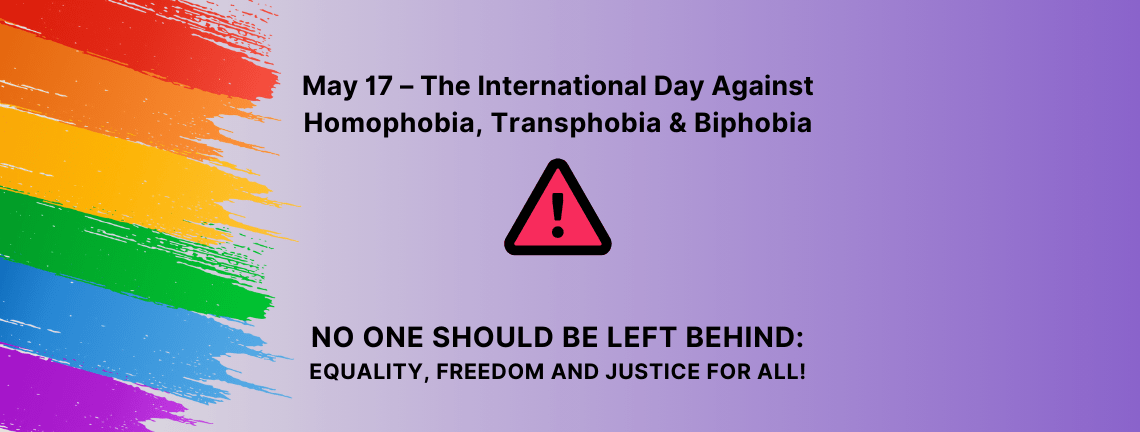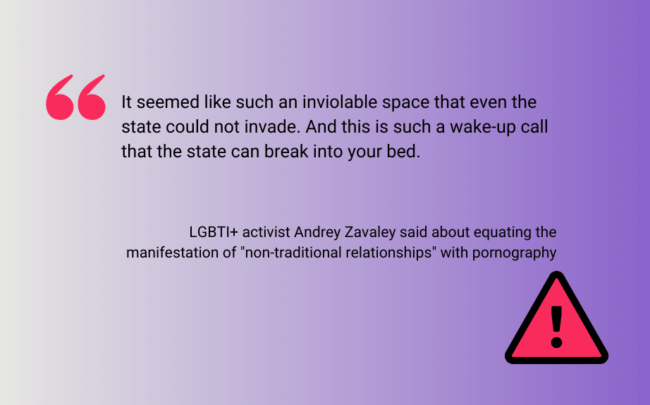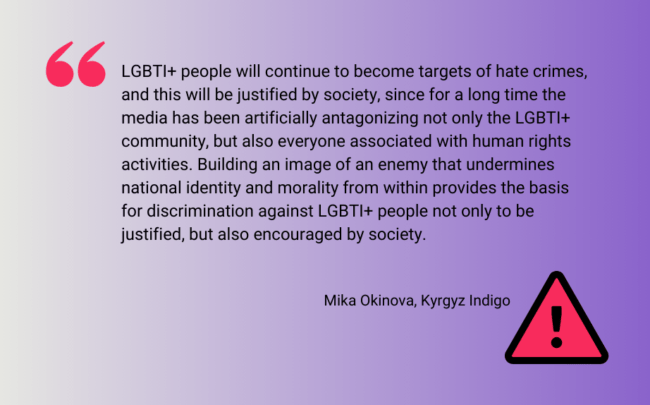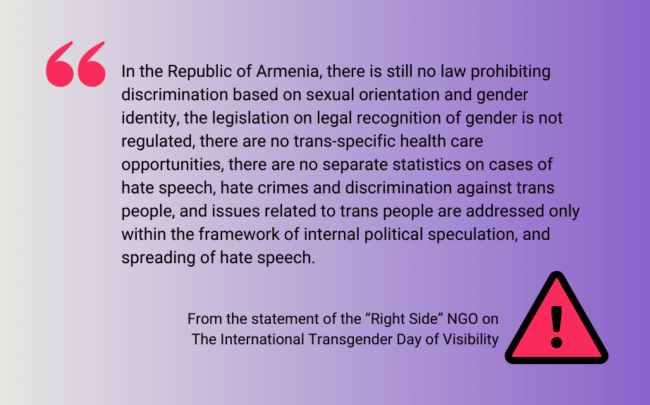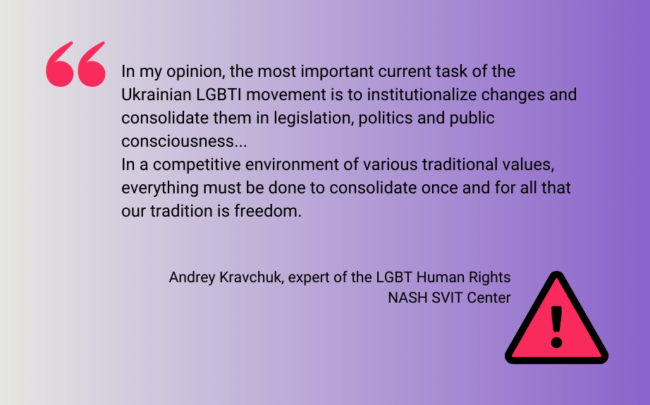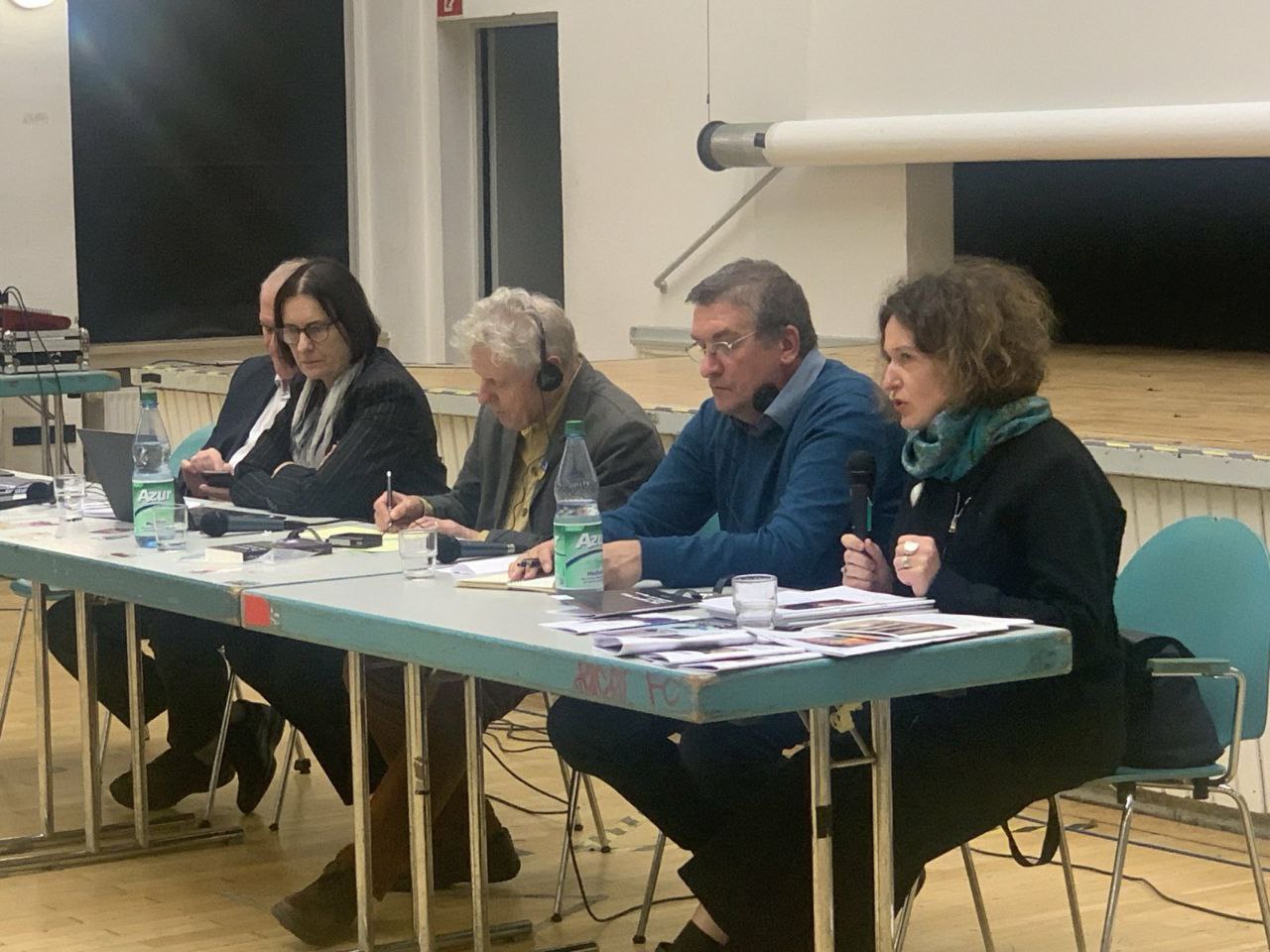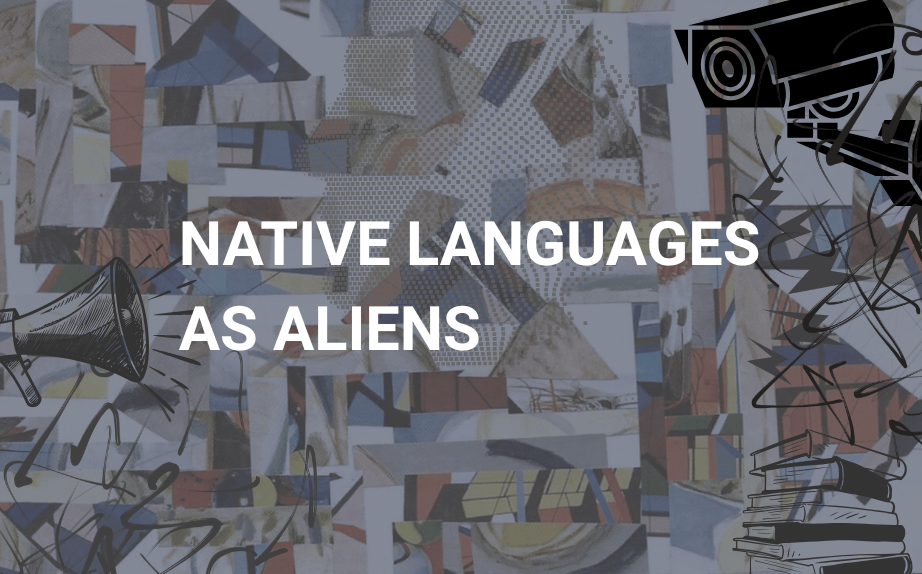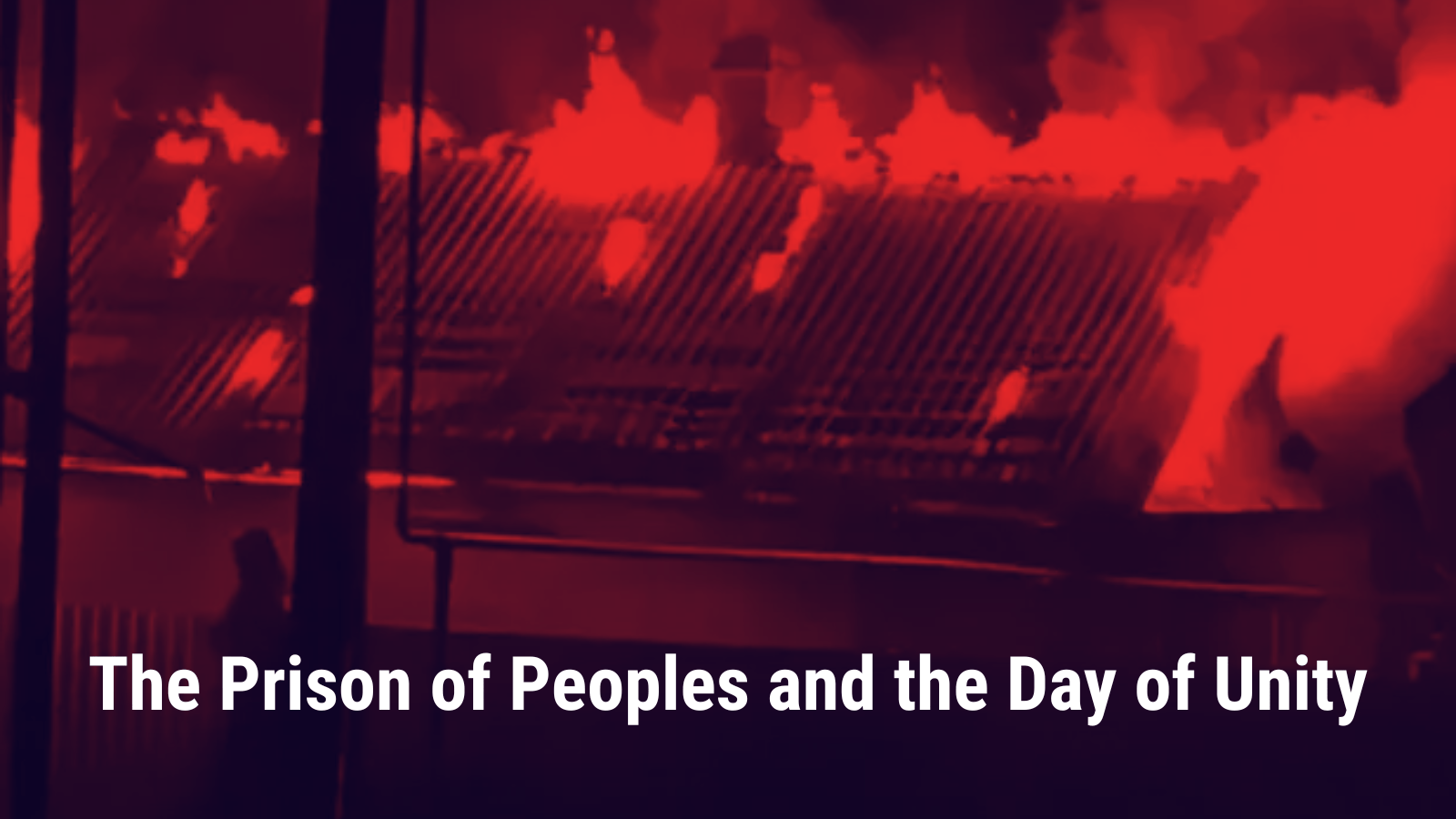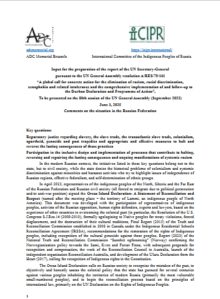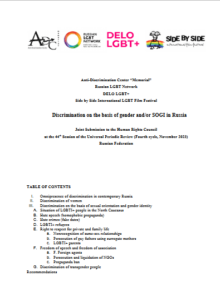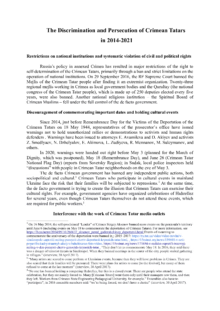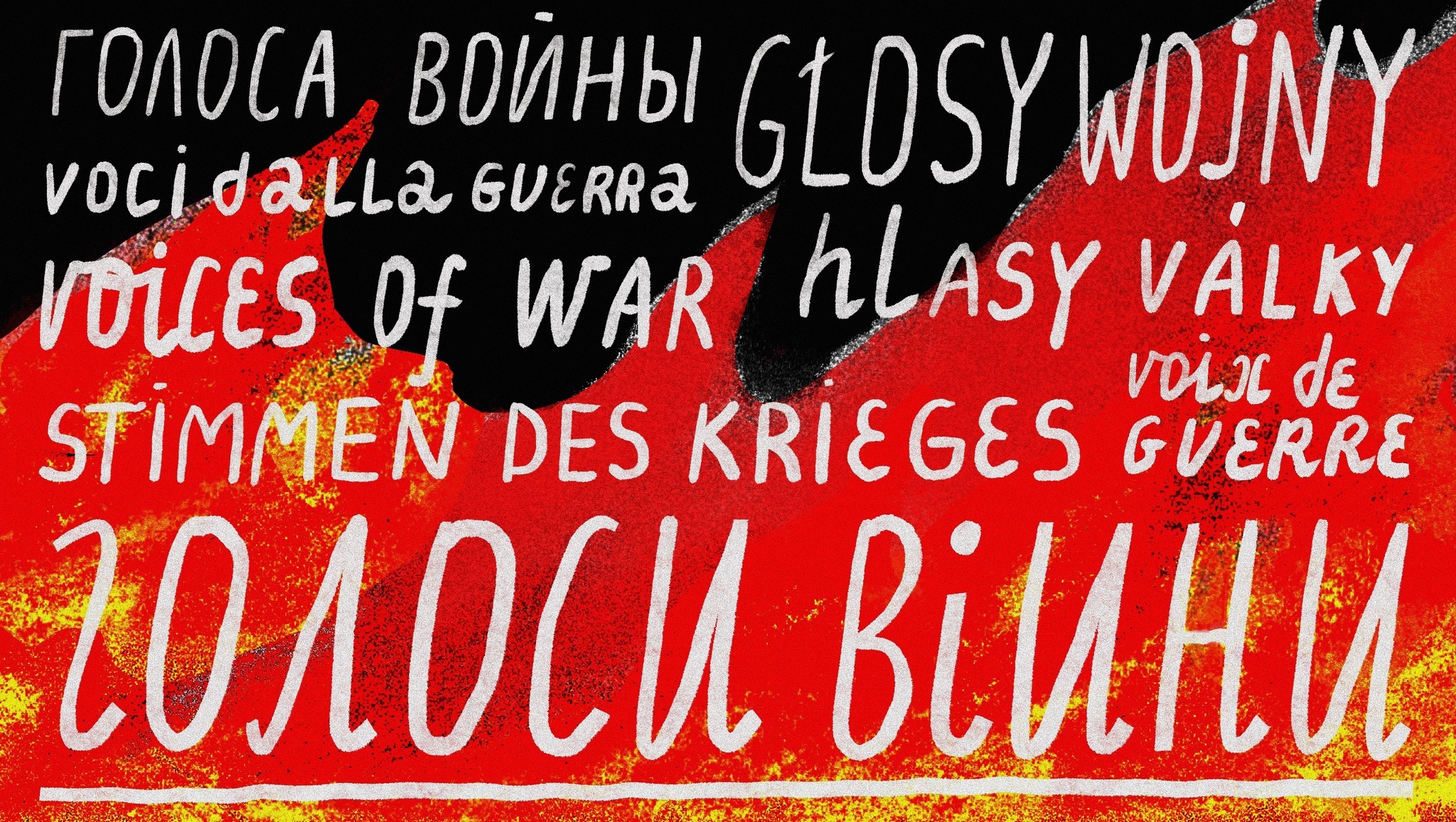The leader of the initiative, an international coalition of LGBTQIA+ organizations, writes:
“The world has just celebrated the 75th anniversary of the Universal Declaration of Human Rights — a document that is much more than a cornerstone of international law: it is a guide to navigating a deeply divided world, a set of values that everyone can live by, and ultimately a force for good. And yet, we know that “All human beings are born free and equal in dignity and rights” represents a promise not yet fulfilled — for LGBTQIA+ people across the world, and for everyone experiencing the suffocating impact of multiple layers of inequality on their lives. This year’s #IDAHOBIT theme is a call for unity: only through solidarity with each other will we create a world without injustice, where no one is left behind”.
The situation of LGBTIQ people in Eastern Europe and Central Asia remains difficult. Repression against LGBTIQ people in Russia has become total: the complete ban of so-called “LGBT propaganda” led to the total exclusion of the topic of LGBTI issues from public space, media, culture, and art. The designation of the so-called “LGBT movement” as an “extremist organization” in fact outlawed LGBTIQ+ people and criminalized the very state of belonging to this group. Homophobic rhetoric and the proclamation of the protection of “traditional values” has become part of Russia’s military propaganda – the fight against LGBT people was declared one of the goals of the invasion of Ukraine and the full-scale war.
Russia is spreading its negative influence, directly or indirectly, to almost the entire region: homophobic laws are de facto in force in the occupied territories of Ukraine, and a number of countries are adopting or trying to adopt repressive legislation based on Russian models (the law on “propaganda” and “foreign representatives” in Kyrgyzstan, on “transparency of foreign influence” in Georgia, etc.).
We have prepared an overview of the state of LGBTIQ rights in the region: in Russia, the main source of homophobic ideology; in countries that have succumbed to Russian influence, to a greater or lesser extent, and to the opinions of the conservative part of their society; in Ukraine, which is fighting Russian military aggression and defending its commitment to European integration. In conclusion, we briefly describe the consistently difficult situation in a number of Central Asian countries.
Russia
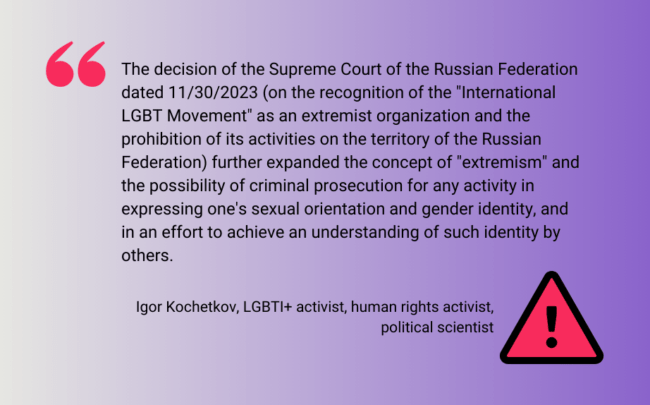
The adoption in June 2013 of a law prohibiting “LGBT propaganda” among minors targeted, first and foremost, LGBTIQ teenagers and the activists who helped them (conducting educational and informational work, organizing support groups and psychological assistance, etc.). Over the past decade, homophobic legislation and practices have been strengthened to such an extent that they extend to almost every sphere of life. After the expansion of the ban on “LGBT propaganda and gender reassignment” to people of all ages in December 2022, due to censorship (and self-censorship), it became impossible to mention LGBTIQ topics in a positive way in the media and in literature, cinema, music, and visual arts. Since the adoption of the law, Roskomnadzor has blocked more than 46.4 thousand pages containing “LGBT propaganda.” LGBTI organizations have ceased their public activities and been liquidated; their employees and activists were forced to leave Russia. Foreign citizens and stateless people are subject to expulsion from Russia for violating the ban on “LGBT propaganda”.
In July 2023, a new law was adopted banning trans*transition, which completely banned medical support and the changing of gender markers in passports and deprived trans*people of the right to adoption/guardianship of children. People diagnosed with “transsexuality” have lost access to medical care and vital medications.
At the end of 2023, the Supreme Court, in a lawsuit of the Ministry of Justice, recognized the non-existent “International LGBT Movement” as an extremist organization. Participation in an extremist organization is criminalized, with punishment that can include imprisonment. This caused a wave of even greater censorship — books are being recalled from sale in bookstores, films are being withdrawn from distribution, and entire episodes from film series are being cut. Despite all its absurdity (the image of a rainbow can be regarded as a demonstration of the symbols of an “extremist organization”), this law is already being applied: for example, three employees of the Pose LGBTIQ bar have been arrested and have been in jail since March 2024 on charges of organizing the activities of an “extremist organization”.
● The OVD-Info project provides a detailed daily chronicle of repression against LGBTIQ people (in Russian).
Belarus
In the course of total repression after large-scale protests in 2020, opposition media, human rights organizations, and environmental and social NGOs were liquidated in Belarus; tens of thousands of people were arrested; and about 5,000 people were convicted on politically motivated criminal articles, 1,386 of whom have been deprived of liberty. Most LGBTI human rights defenders were forced to leave the country. Freedom of speech, assembly, and association is extremely limited, and organizations, initiatives, blogs, and social media accounts are declared “extremist.”
After the adoption of the law on the complete prohibition of “LGBT propaganda” in Russia in December 2022, similar bans began to be proposed in Belarus. Parni PLUS quotes Natalia Kachanova, Chairman of the Council of Ministers of the Republic of Belarus: “There is such an opinion, and maybe we will need to come up with a legislative initiative on the inadmissibility of the spread of LGBT people. When I was on an official visit to Moscow, just that day the State Duma passed the law banning LGBT propaganda. We’ll probably have to accept it, too. And it will be the right thing to do.”
On September 12, 2023, Roman Sidorenko, senior prosecutor of the Department for Supervision of the Enforcement of Legislation on Minors and Youth, announced that the Prosecutor General’s Office of Belarus would begin drafting a bill banning “LGBT propaganda” in order to “protect children from possible criminal acts and neutralize the efforts of certain Western countries to harmfully promote non-traditional sexual relations, gender reassignment and childfree ideology”. According to this draft, three new articles will be added to the Code of Administrative Offenses — “on the prohibition of propaganda of LGBT, pedophilia, and gender reassignment.” According to the prosecutor, “propaganda” will be understood as “any communication [of such information] to society on the internet, in public speeches, in publications.”
In early January, the Secretary of State of the Security Council of the Republic of Belarus, Alexander Volfovich, announced in the media a future discussion of the concept of national security that would include the need for additional protection of the institution of the traditional family as a union between a woman and a man by birth, as well as the need to identify the source of the threat to the family and ways to neutralize it. This was included in the final concept of national security in the form of standard phrases about supporting traditional national values.
On February 9, Prosecutor General Andrei Shved reported that “At the initiative of the prosecutor’s office, a bill has been prepared that will establish administrative responsibility for promoting abnormal relationships, pedophilia, and voluntary refusal to have children. This project is currently undergoing the approval procedure.”
On April 12, 2024, a decree of the Ministry of Culture came into force that expanded the concept of pornography. It includes “non-traditional sexual relations and (or) non-traditional sexual behavior (homosexuality, lesbian love, sadism, masochism, pedophilia and others).” Decisions on banning the distribution of such material will be made by the Republican Expert Commission for the Prevention of Propaganda of Pornography, Violence and Cruelty. According to the Code of Administrative Offences, “[p]ossession and distribution of pornographic materials or objects of a pornographic nature” is punishable by a fine, and repeated violation within a year leads to criminal responsibility.
The suppression of LGBTI+ rights also occurs under existing repressive practices. “We have certain tools. Russian colleagues who have such a law confirm that we work even more effectively without the law than they do,” said Belarusian Information Minister Vladimir Pertsov (quoted by BelTA). In a speech to the media, Deputy Minister of Information Igor Buzovsky suggested written denunciations in the case of the printing and sale by Russian publishers in Belarus of literature, banned in Russia, that positively mentions LGBTIQ topics.
Kyrgyzstan
Over the past six months, Kyrgyzstan has adopted two laws that copy similar Russian ones: the law banning “LGBT propaganda” among minors and the law on NGOs as “foreign agents”.
In August 2023, the Law “On Measures to prevent harm to the health of children, their physical, intellectual, mental, spiritual and moral development in the Kyrgyz Republic” was amended to include information that harms the health or development of children and is prohibited for dissemination to children: information that denies familial and traditional social values, that promotes non-traditional sexual relationships, and that creates disrespect for parents or other family members. The dissemination of such information is punishable by a fine.
On April 12, 2024, another analogue of the Russian law came into force — the law on the registration of NGOs, or “foreign agents”. The law strengthens state control over NGOs (including surprise inspections) and obliges them to submit additional reports and to accompany their publications with a label, similar to the stipulations mentioned in the Russian law.
In August 2023, the draft law “On ensuring the right to equality and protection from discrimination” was published for public discussion. On December 25, the draft law was considered in the Committee of the Jogorku Kenesh. During the discussion, the parliamentarians demanded that an exhaustive list of persons who may suffer from discrimination be included in the draft law in order to exclude the possibility of using the law for protection of LGBTI+ people.
Legislation in Kyrgyzstan does not provide the possibility to make changes to the birth certificates of people who want to change their gender marker. In each specific case, the issue is resolved individually in court.
The Eurasian Coalition on Health, Rights, Gender and Sexual Diversity (ECOM) notes in a country report that law enforcement officials systematically violate the rights of LGBTI+ people: they threaten to out them and extort them for financial resources in exchange for silence. The victims consider seeking justice and appealing to higher authorities to be a futile pursuit and are even afraid of negative consequences if they take steps to protect their rights.
Kazakhstan
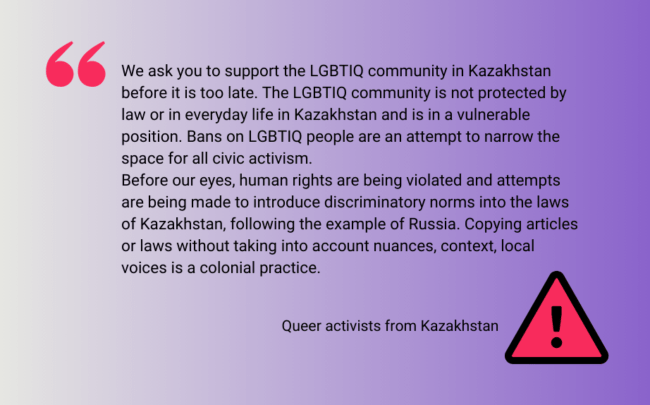
Since 2014, attempts have been made in Kazakhstan to ban the dissemination of information about LGBTI+ topics among minors. After the complete ban on public information about LGBTI+ topics in Russia among people of all ages in December 2022, some deputies of the Mejilis began actively lobbying for the adoption of a similar law in Kazakhstan. In their speeches, conservative politicians and public figures often associate “LGBT propaganda” with women’s struggle against domestic violence, the expansion of women’s political and labor rights, and the fight against gender discrimination. On March 8, 2024, feminists were denied permission to hold street rallies because, according to the mayor’s office, they promote “non-traditional values, same-sex relationships and LGBT symbols.”
So far, the proposal of the deputies of the Mejilis from the Amanat party to amend the law “On Mass Media” and to ban any publications about LGBTI+ topics in the media has not been included in the final bill, nor has the initiative to include “propaganda for non-traditional sexual relations” in the list of reasons to refuse permission for peaceful assemblies and actions.
At the same time, LGBTI+ activists are often refused permission to hold peaceful street actions under various pretexts, and the courts do not find violations in the exercise of the right to freedom of assembly.
“Before our eyes, human rights are being violated and attempts are being made to introduce discriminatory norms in the laws of Kazakhstan, following Russia’s example. Copying articles or laws without taking into account nuances, context, and local voices is a colonial practice,” according to Kazakh queer activists.
A number of strictures relate to children’s rights. In January 2024, an educational website, Selftanu.kz, was opened for queer teenagers and for their friends and families. A month later, it was blocked for “posting information harmful to the health, moral and spiritual development of children.”
“The authorized body for the Protection of Children’s Rights considers it necessary to restrict access to internet resources that disseminate the ideas of the LGBT movement among the Kazakh population, taking into account the psychological age of children, their vulnerability to the negative influence of the information environment, historical and other traditions, the cultural values of Kazakh society and the state, as well as the proper upbringing and full-fledged development of children”, the Ministry reported.
On February 23, 2024, the President signed the law “On education, mentoring and child safety”. According to this law, “a person who adheres to non-traditional sexual orientation” in Kazakhstan will not be able to be a mentor for orphans and children left without parental care. First Vice Minister of Education Natalia Zhumadildaeva told reporters that the sexual orientation of mentors will be determined using a “special psychological test.”
Trans*people are in a very vulnerable position. According to Kazakhstan’s laws, “surgical sex reassignment” is an obligatory prerequisite for the legal recognition of a gender marker change. In June 2023, the UN Committee against Torture, in its recommendations after reviewing the state report of Kazakhstan, called on the government to abolish the requirement for mandatory surgical sex reassignment, as it makes the legal procedure invasive and humiliating. In the 2020 study “We live until we are seen”, the vast majority of transgender respondents report that they have faced discrimination or violence of various kinds based on their gender identity; almost half of them have been bullied at work or school. The main reasons are the inconsistency of documents with a person’s gender identity due to the complex procedure for changing documents and the inability to protect oneself due to the lack of anti-discrimination legislation, including recognition of SOGI as a basis for possible discrimination.
The Eurasian Coalition on Health, Rights, Gender and Sexual Diversity (ECOM) has compiled a country report on violations of the rights of LGBT people and MSM in Kazakhstan: in 2023, 83 cases of violations of LGBT rights were documented. In most cases, gay men and other MSM became victims; 16 cases relate to trans*women. The most common crimes are blackmail, extortion, threats, beatings, outing, and disclosure of the HIV status of LGBT people. This happens due to the inaction of the police, since violators know that LGBT people are poorly protected and are highly likely not to contact the police, fearing discrimination and the disclosure of personal information.
The Constitution of Kazakhstan enshrines the principle of equality and non-discrimination, including on the basis of sex and other circumstances. So far, there are no guarantees in Kazakh legislation Kazakhstan of protection against discrimination based on sexual orientation or gender identity. Nevertheless, on December 8, 2023, the President of the Republic of Kazakhstan signed a Decree “On an action plan in the field of human rights and the rule of law”, according to which a permanent working group on anti-discrimination legislation should be established in 2024.
In 2022, the Kazakhstan authorities amended the tax code and established a register of persons receiving foreign financing. Information is provided for persons whose activities are aimed, in particular, at providing legal assistance; protecting and representing the interests of citizens and organizations; conducting public opinion polls; and collecting, analyzing, and distributing information. In the autumn of 2023, the “register of persons receiving money and (or) other property from foreign states, international and foreign organizations, foreigners, and stateless persons” was published. Svetlana Ushakova, Director and co-founder of INMIR, believes that this provision of the tax code is a de facto analogue of the law on NGOs as “foreign agents”: the inclusion of NGOs in a public register, the requirement to label informational material (“prepared with foreign financing”), and the exemption from such reporting for state and pro-state NGOs and deputies. The expert sees this as a “trend towards limiting the activities of public organizations and civil society activists.”
Azerbaijan
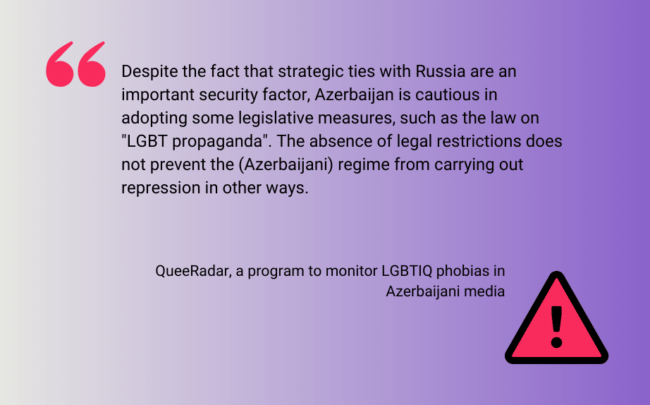
In Azerbaijan, LGBTI+ activists are persecuted, their attempts to enter the open public space are suppressed, and human rights defenders are subjected to repression.
In 2022, the high-profile homophobic murder of Azerbaijani journalist and LGBTIQ+ activist Avaz Hafizli took place. The murder was preceded by a video post on Instagram by Azerbaijani influencer Sevinj Huseynova, who called for the physical destruction of “sexual minorities” and transsexuals. At the sentencing, the fact that this crime was committed on the basis of hate (the so-called “honor killing” was committed by the victim’s cousin) was not taken into account.
Azerbaijan ignores the recommendations of international institutions on the need to adopt an anti-discrimination law, which, among other things, should include guarantees for the protection of LGBTIQ rights (for example, the recommendations of the UN CEDAW [2022], which take into account other reports of ADC Memorial and its partners). After the expansion of the law on the complete prohibition of “LGBT propaganda” in Russia in 2022, some politicians said that a similar law is necessary for Azerbaijan.
Georgia
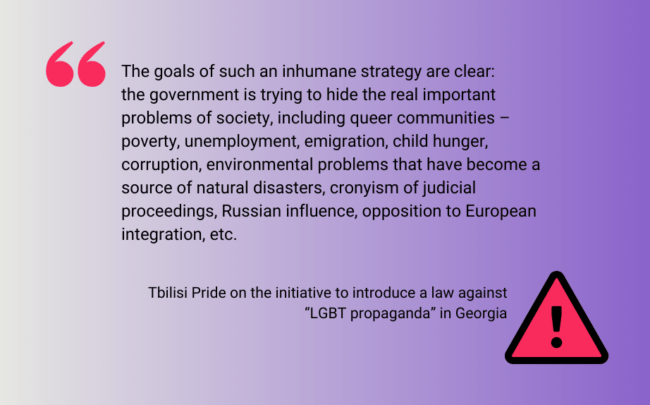
In recent years, there has been significant polarization in Georgia regarding the topic of LGBTIQ+ rights. On the one hand, in 2014 Georgia adopted a law on combating all forms of discrimination, including discrimination based on sexual orientation and gender identity. At the same time, the enforcement of the law is difficult due to the homophobia of the police; the aggression of the conservative, patriarchal part of society; and the lack of a state strategy to combat discrimination. The homophobic position of the Georgian Orthodox Church has a significant impact: contrasting the International Day against Homophobia and Transphobia with traditional values, the Church has been celebrating May 17th as “Family Holiness Day” since 2014. On this day, marches with thousands of participants are held in the cities around the country.
Georgian Ombudsman Levan Ioseliani, in the 9th Report for 2023, noted that the state is not taking effective measures to prevent violence and threats from far-right organizations against LGBTIQ+ people and their activities, and that the National Human Rights Protection Strategy for 2022-2030 again fails to include the protection LGBTIQ+ rights, similar to the previous strategy. Due to constant threats and attacks by far-right homophobes, the events of Tbilisi Pride Week in 2023 were held in a closed format, while the final LGBTIQ+ festival on June 8, held on private land, was attacked. Instead of preventing a pogrom and limiting the crowd, the police simply evacuated the pride organizers, who were forced to cancel the event.
While a year ago, in March 2023, after mass protests, the Georgian Parliament rejected the bill on “foreign agents” at the second reading, this year, the bill, despite even greater public resistance, passed the third reading.
The attack on LGBTIQ+ rights has also intensified. In May 2023, the pro-Russian homophobic Conservative Movement party, together with the far-right Alt-Info television company, tried to initiate a package of amendments, one of which was an amendment to the law “On Assemblies and Demonstrations” banning demonstrations or propaganda at meetings of “non-traditional sexual orientation.” At this time, the amendments were rejected.
A year later, on April 3, 2024, the ruling party initiated constitutional amendments against “LGBT propaganda”: a ban on adoption for LGBT people; a ban on any medical intervention related to gender reassignment; and a ban on meetings and the distribution of programs or materials “promoting” same-sex unions or medical interventions related to gender reassignment. The Georgian Parliament has approved a commission for public discussion of the draft LGBT-phobic amendments to the Constitution. LGBT activists fear that these amendments may go unnoticed amid large protests against the bill on foreign agents.
In preparing for the parliamentary elections to be held in autumn 2024, the ruling Georgian Dream party is increasingly using homophobic populism. At the same time as the law on non-governmental organizations, discriminatory amendments to the constitution against “LGBT propaganda” are being proposed. The arguments used to promote them are the need to combat pseudo–liberal values and their inevitable, harmful consequences for the “traditions of the people”.
Many experts say that Russia has a significant negative impact on legislative and public processes in Georgia. Supporters of Georgia’s European integration who attended the mass protest demonstrations call the Georgian law on foreign agents and amendments to the constitution “Russian laws.”
On April 25, 2024, the European Parliament adopted a resolution condemning the bills proposed in Georgia on “foreign agents” and against LGBTIQ+:
“The constitutional amendments restrict the rights of the LGBTIQ+ community and are an attack not only on the LGBTIQ+ community, but also on freedom of speech and a free civil society.”
Council of Europe Commissioner for Human Rights Dunja Mijatovic called on the Georgian authorities to comply with their human rights obligations, including with regard to the protection of LGBTIQ+ rights, and on Georgian politicians to condemn the use of LGBTIQ+ phobia or any other discriminatory rhetoric in election campaigns.
Armenia
The struggle between progressive and homophobic conservative tendencies is also on display in Armenia.
In September 2023, the Government of the Republic of Armenia published a draft action plan for 2023-2025, reflecting the National Strategy for the Protection of Human Rights. According to the plan, a law on combating discrimination should be adopted in 2024. Since 2012, Armenian civil society, including the public organization Pink Armenia, has been promoting the adoption of an anti-discrimination law, but the demands of the LGBTIQ+ community and human rights defenders to include SOGI as one of the grounds for discrimination are being resisted by the legislative authorities and church leaders.
On April 12, 2024, the Armenian Parliament adopted a package of amendments and additions to the law “On the prevention of domestic violence, protection of persons subjected to domestic violence and restoration of solidarity in the family” to increase the protection of citizens from domestic violence and overcome its consequences for cohabiting partners. The Armenian Apostolic Church opposed the concept of “partner” as “a person with whom there is a relationship, which is characterized by a love affair, regardless of cohabitation or sexual relations,” insisting on defining the family only as “the union of a man and a woman blessed by God.”
Armenian legislation does not regulate the legal recognition of gender: changes to the gender marker in passports and medical interventions for trans* transition are not legally provided in the country.
In 2023, the Eurasian Coalition on Health, Rights, Gender and Sexual Diversity (ECOM) registered 67 cases of offenses against LGBTIQ+ people in Armenia, among them the murders of two trans* women. According to ECOM, the criminals clearly understood that people from this group were deprived of the opportunity to defend their rights. Despite the recommendations of the Council of Europe and the OSCE, hate crimes are not registered as such, since the motive of prejudice is not considered an aggravating circumstance.
At the same time, court decisions in favor of LGBTIQ+ people have been noted in Armenia: for example, Armenia granted asylum to Salman Mukaev, a Chechen who escaped from torture. His extradition was refused, since the court recognized that it was dangerous for LGBTIQ+ people to be in Chechnya, and that in Russia their rights could be violated due to homophobic laws.
Moldova
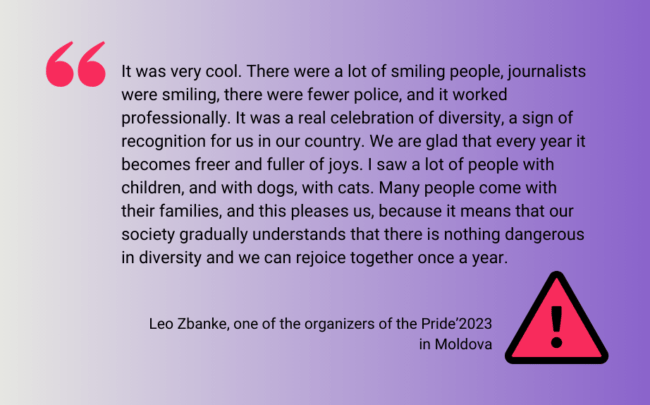
In 2022, amendments to the anti-discrimination Law were adopted adding SOGI to the grounds of discrimination. At the same time, the level of domestic homophobia remains high, and politicians and public figures use homophobic rhetoric in political debates and as a tool of manipulation.
The Office for the Reintegration of Moldova has intensified discussions on a law that will provide “legal protection” to Transnistrian refugees from human rights violations in their region, including those based on SOGI. This was a reaction to the plans of the de facto authorities of the unrecognized Transnistria to impose penalties for “propaganda of non-traditional sexual relations” which are in place in Russia.
Six Russian citizens from the LGBTI community were denied asylum in Moldova in February 2024. According to GENDERDOK-M, four young people applied for refugee status because of the risk of being mobilized for war, as well as because they are homosexuals. The same response was received by a transgender woman who stated that she was afraid for her safety and life, and was also afraid to be mobilised in the army, as an opponent of the Russian war of aggression in Ukraine. The General Inspectorate for Migration replied that “individuals have certain obligations to protect their country, and their evasion of military service in the Russian Federation does not pose a risk of persecution.”
Ukraine
Three years of full-scale war and the need to defend against Russian aggression, fueled by reactionary homophobic ideology, has had a huge impact on LGBTIQ+ people and their acceptance in Ukrainian society.
We present short excerpts and summaries from detailed reports on the situation of LGBTIQ+ people prepared by Insight “LGBT+ people of Ukraine during a full-scale war. The year 2023. The current situation and dynamics of changes” (in Ukrainian); and by the LGBT Human Rights NASH SVIT Center, “War and Civil Partnerships. The situation of LGBTQ people in Ukraine in 2023” (in Ukrainian and English).
“In 2023, the main issue for Ukrainian society in general and the LGBTQ community in particular has remained the protection of Ukraine from Russian aggression. The number of openly LGBTQ military personnel has increased significantly – in particular, openly transgender people have appeared, despite the fact that current legislation still formally restricts their service in the Armed Forces. According to the testimonies of LGBTQ members of the military, the attitude towards them from colleagues and commanders is generally tolerant, although there are rare cases of homo/transphobic discrimination and violence.”
The full-scale war has actualized the need to protect the rights of same-sex family partners. In the summer of 2022, a petition to legalize same-sex marriage quickly gained the 25,000 votes needed for consideration. The decision of the European Court of Human Rights on 06/01/2023 in the case “Maymulakhin and Markiv v. Ukraine” recognized that Ukraine was in violation of Article 8 of the European Convention on Human Rights (the right to respect for personal and family life) and Article 14 (prohibition of discrimination) due to the absence of any form of state registration of same-sex family partners. People’s Deputy Inna Sovsun, supported by a number of colleagues from the ruling party and the pro-European opposition, submitted bill No. 9103 “On the Institute of Registered Partnerships” to the Verkhovna Rada on March 13, 2023. It contains a detailed regulation of partnerships, which should be equally accessible to both same-sex and male-female couples and are equated to a family, with some restrictions. The law also provides recognition of all partnerships, including same-sex ones, registered abroad. Advocacy for the adoption of this bill has become the most important political issue for the Ukrainian LGBTIQ+ movement and has been actively supported by the media.
The total number of cases of discrimination, hate crimes and other violations of LGBTIQ+ rights has been decreasing since 2020. LGBTIQ+ activists note that LGBTIQ+ Pride Month in 2023 has found massive symbolic support from large and medium-sized businesses.
Back in May 2021, the Cabinet of Ministers submitted to the Verkhovna Rada a draft of Law No. 5488, developed by the Ministry of Internal Affairs, which criminalizes hate crimes and hate speech, as well as establishing a clear ban on discrimination on the grounds of SOGI. In May 2023, it was finally considered by the relevant Committee on Law Enforcement of the Verkhovna Rada, which recommended the adoption of the draft in the first reading. Now it can be submitted to the plenary session of the Parliament. On April 11, 2024, the ECHR issued a decision in the case of “Karter v. Ukraine“, recognizing the improper investigation of homophobic attacks and the violation of Article 3, “Prohibition of Torture” in combination with Article 14, “Prohibition of discrimination”. Presumably, the ECHR’s decision would accelerate the adoption of Law No. 5488.
In 2023, a new clinical protocol ICD-11 was in progress. Its implementation will provide a less painful, faster, and more transparent procedure for transgender transition.
The main opponent of legal equality for LGBTIQ+ people remains the leading Ukrainian churches, which are members of the All-Ukrainian Council of Churches, and ultraconservative and radical nationalist socio-political forces, such as the National Corps, Right Sector, Svoboda and other parties. They are not influential at the national level, but their representatives are on local councils, especially in western Ukraine, where they consistently promote a homophobic agenda together with religious activists.
In February 2023, the Verkhovna Rada withdrew from consideration bill No. 3916, authored by an MP, Grigory Mazurash (Servant of the People party), who is well known for his homophobic initiatives. He proposed to ban “propaganda of homosexuality and transgenderism,” following Russia’s example.
Tajikistan
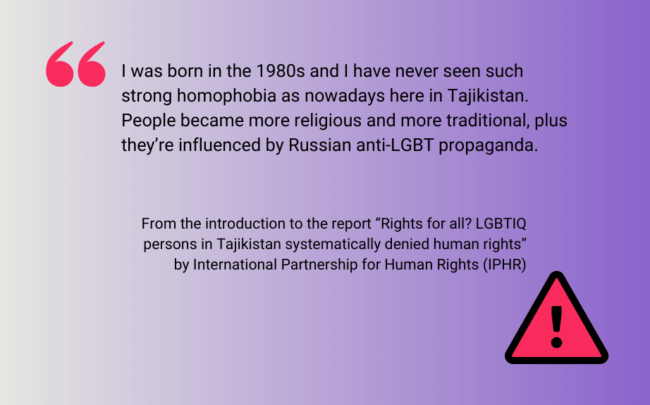
In 2022, the Law on Equality and the Elimination of All Forms of Discrimination came into force in Tajikistan, but SOGI and the concept of gender are not included, which reduces the protective potential of the law for such a vulnerable and discriminated group in Tajikistan as LGBTIQ+ people.
In Tajikistan, it is impossible to discuss the rights of LGBTIQ+ people publicly, to register relevant organizations and fight discrimination on the basis of SOGI, and to talk openly about sexual orientation and identity. The state and society reject LGBTIQ+ people; various “traditional treatments” for homosexuality are practiced.
According to the Eurasian Coalition on Health, Rights, Gender and Sexual Diversity (ECOM), 25 cases of violations of the rights of LGBTIQ+ people were registered in Tajikistan in 2023. In 15 cases, the perpetrators were law enforcement officers: by organizing fake dates, they blackmail people by threatening to disclose that they belong to the LGBT community, force them to take HIV tests, and confiscate their phones and view their photos. Most often, LGBT people are threatened with persecution under two articles of the Criminal Code of the Republic of Tajikistan: under Article 241, “Illegal producing and trafficking of pornographic materials or objects,” for any intimate photos found on their phones, and under article 125, “Infection with the human immunodeficiency virus,” for “knowingly exposing another person to the risk of infection with HIV” if HIV is detected in one of the partners, which can be punishable by imprisonment for up to 2 years.
Uzbekistan
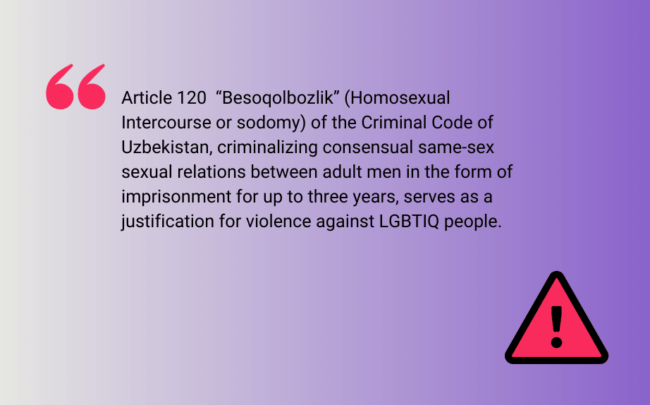
Article 120 of the Criminal Code, which penalizes consensual same-sex sexual relations between adult men with imprisonment for up to three years, is used as a justification in cases of violence against LGBTI people. Because of this, LGBTI people in Uzbekistan regularly face numerous violations of their rights, homophobia, and discrimination in all spheres of life. NGOs defending LGBTI rights cannot register and work openly. Participation in unregistered organizations or inducement to participate in the activities of such an organization carries the threat of criminal prosecution and imprisonment for up to 5 years.
Human rights organizations and international institutions have repeatedly called for the decriminalization of voluntary same-sex sexual relations between adult men. In response, representatives of government agencies of Uzbekistan have stated that the decriminalization of same-sex relations may cause public discontent, is incompatible with the concept of “widespread traditional family values” and will spoil the country’s image in the Muslim world. In November 2023, in the state report within the framework of the UN Universal Periodic Review, Deputy Interior Minister Yahejon Abdulkhakov announced that 27 people had been involved in criminal cases under Article 120 of the Criminal Code since the beginning of 2023.
The report of the Eurasian Coalition on Health, Rights, Gender and Sexual Diversity (ECOM) on the violation of LGBTI rights in Uzbekistan for 2023 recorded 191 cases of human rights violations on the grounds of SOGI. The total number of victims is 209 people, including 193 gay men and other MSM, 10 trans* women, 4 lesbians, 1 heterosexual man and 1 heterosexual woman, who faced rights violations due to their association with the LGBT community and accusations of LGBT propaganda. Half of the violations were committed by representatives of government agencies, primarily law enforcement: threats/intimidation, insults, illegal searches, and blackmail/extortion. ECOM pays special attention to the use of anal examinations under Article 120 of the Criminal Code to establish the homosexuality of the accused people, which amount to torture and are condemned by the international medical community.
Turkmenistan
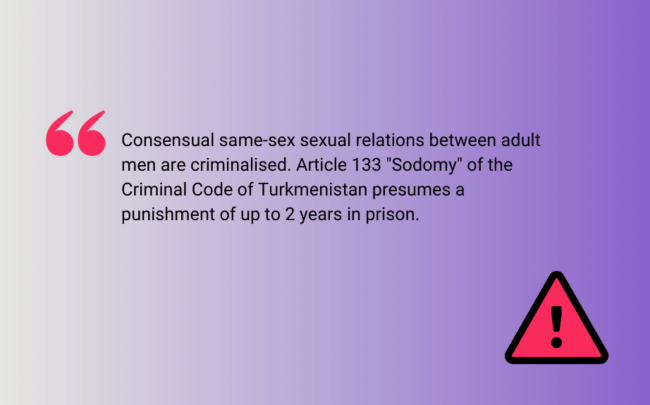
In Turkmenistan, the criminal prosecution of consensual same-sex sexual relations between adult men continues. Article 133, “Sodomy,” of the Criminal Code provides for punishment of up to 2 years in prison. After the new version of the Criminal Code came into force on January 1, 2023, the age of criminal liability under Part 4 of Article 133, “Sodomy with the use of physical violence, threats of its use, and the use of the helpless state of the victim” resulting in death, serious harm to health, or infection with HIV, was lowered to 14 years.
From the moment of detention to the end of imprisonment, men are subjected to derogatory treatment, torture, and violence, including sexualized violence. Those who have served their sentence under the article “sodomy” have no chance at finding a good job and arranging their lives — they are forced to live in constant fear, awaiting renewed persecution.
The situation of transgender people in Turkmenistan is extremely difficult. The law does not say anything about the possibilities, grounds and procedures for gender reassignment of transgender people, while the law allows intersex people to change their last name and first name “in connection with a sex change.” Transgender people must undergo surgical correction abroad, but it is impossible to change their documents. Due to the impossibility of professional success, they often find themselves involved in prostitution and become victims of police raids. Transphobic police violence and harassment against transgender people is particularly violent and includes physical, psychological, and sexualized violence, threats, and harassment. Transgender women are in a more difficult position than men, both because of their visibility and the associated public condemnation, and because of gender discrimination.









 Feedback
Feedback 